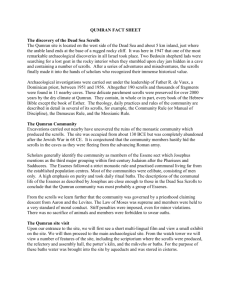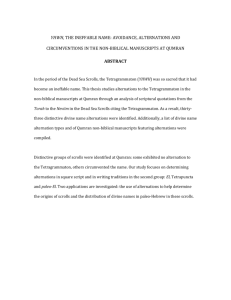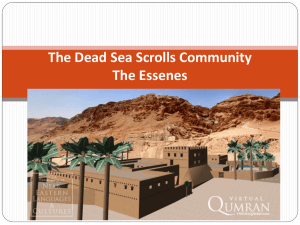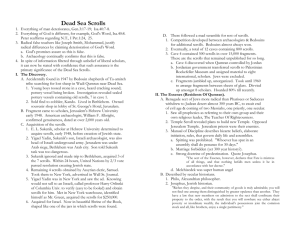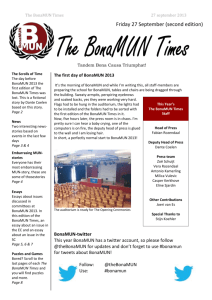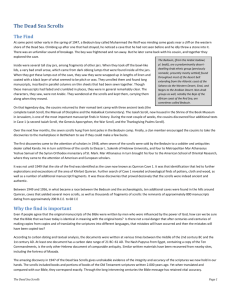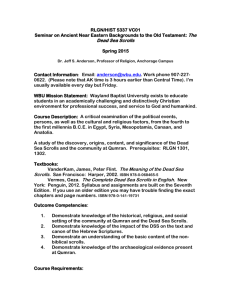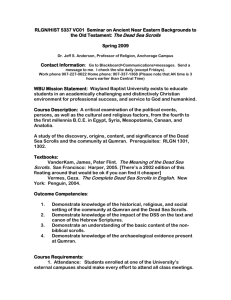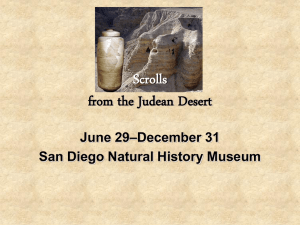Dead Sea Scrolls Slide Show - Institute of Catholic Culture
advertisement
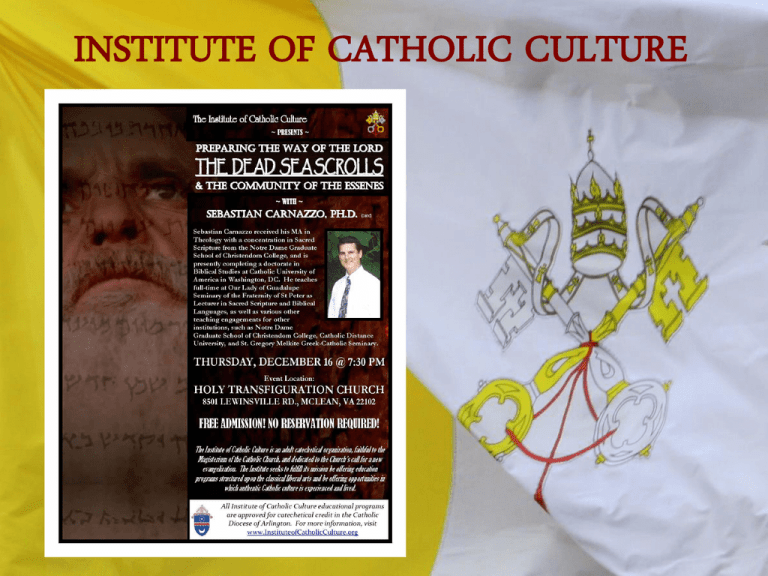
INSTITUTE OF CATHOLIC CULTURE Different Senses of the title “Dead Sea Scrolls” Broad Sense: Scrolls and fragmentary documents found at a number of different locations in the general region of the Dead Sea, including Masada, as well the earlier archaeological finds of the 19th century in Egypt, especially those of the Cairo Genizah. Narrow Sense: Scrolls and fragmentary documents found in 11 caves on the northwest shore of the Dead Sea near the Wadi Qumran. As you may be wondering what is “Qumran” and what relation do the DSS have to it? • • • • Aqueduct Building with many rooms Cemetery Farming plots in the vicinity The Historic Significance of the Dead Sea Scrolls 1. They supply firsthand knowledge about the forms of Hebrew, Aramaic, and Greek that Jews spoke and wrote in the first century AD. 2. They testify to the shape of the text of the Old Testament that the Jews were reading in Palestine in the period. 3. They shed new light on the diverse forms of Judaism in Palestine in the period. 4. And as a result, the discovery has provided much information about the religious and political matrix of first century Palestine, the time and place in which Jesus was born. What is the significance of the DSS for NT Studies? Before the discovery of the DSS 1.There were sparse inscriptions in Aramaic, Greek, and Hebrew. 2.The writings of the Jewish historian Flavius Josephus (c. AD 37-100). 3. The writings of Philo of Alexandria (30 BC—AD 45) Three Categories among the DSS 1. Biblical Texts 2. Sectarian Texts 3. Intertestamental Literature. Which category do you think is the most important? Two texts from cave 4 of Qumran now give evidence that there were Hebrew texts in existence from the time of the composition of the LXX that had a count of seventy-five persons (4QGen-Exoda 17-18:2; 4QExodb 1:5). What are some examples of the Significance of the other two categories of texts? Is there any relationship between John the Baptist and the DSS? Josephus described John likewise: Now some of the Jews thought that the destruction of Herod's army came from God, and was a very just punishment for what he did against John called the baptist. For Herod had him killed, although he was a good man and had urged the Jews to exert themselves to virtue, both as to justice toward one another and reverence towards God, and having done so join together in washing. For immersion in water, it was clear to him, could not be used for the forgiveness of sins, but as a sanctification of the body, and only if the soul was already thoroughly purified by right actions. And when others massed about him, for they were very greatly moved by his words, Herod, who feared that such strong influence over the people might carry to a revolt -- for they seemed ready to do any thing he should advise -- believed it much better to move now than later have it raise a rebellion and engage him in actions he would regret. And so John, out of Herod's suspiciousness, was sent in chains to Machaerus, the fort previously mentioned, and there put to death; but it was the opinion of the Jews that out of retribution for John God willed the destruction of the army so as to afflict Herod (Antiquities 18.5.2 §116-119). According to Josephus, Essenes were known to take “other men’s children, while yet pliable and docile… and mold them according to their own ways” (J.W. 2.8.2 § 120). And Josephus even tells about how he himself had spent time as a youth among the Essenes (Life 2 § 10-11). In all four Gospels: “The voice of one crying out in the wilderness” (Isa 40:3). “…to go into the desert to prepare there His way, as it is written, ‘Make ready in the desert the way of …[=YHWH]; make straight in the wilderness a path for our God” (1QS 8:12-16). According to the NT, John the Baptist not only baptized, but preached the need for repentance as well (Matt 3:4-10; Luke 3:7-9). Josephus described John similarly: He was a good man and had urged the Jews to exert themselves to virtue, both as to justice toward one another and reverence towards God, and having done so join together in washing. For immersion in water, it was clear to him, could not be used for the forgiveness of sins, but as a sanctification of the body, and only if the soul was already thoroughly purified by right actions. The NT also describes John as foretelling the coming of one after him who would baptize with the Holy Spirit and fire (Luke 3:16). Baptism among the DSS He [who does not repent] will not become clean by the acts of atonement, nor shall he be purified by the cleansing water, nor shall he be made holy by the seas or rivers, nor shall he be purified by all the water of ablutions. Defiled, defiled shall he be all the days he spurns the decrees of God, without allowing himself to be taught by the community of his counsel. For, by the spirit of true counsel concerning the paths of man all his sins are atoned so that he can look at the light of life. And by the spirit of holiness which links him with his truth he is cleansed of all his sins. And by the spirit of uprightness and of humility his sin is atoned. And by the compliance of his soul with all the laws of God his flesh is cleansed by being sprinkled with cleansing waters and being made holy with the waters of repentance (1QS 3:4-9). [God] will purge by His truth all the deeds of human beings, refining [i.e., by fire] for Himself some of mankind to remove every spirit from their flesh, to cleanse them with a holy Spirit, and sprinkle them with a Spirit of truth life purifying water (1QS 4:20-21). One shall not enter the water to partake of the pure meal of holy men, for they shall not be cleansed unless they repent of their wickedness; for unclean are all who transgress His word (1QS 5:13-14). Is there any relationship of the DSS to the life or words of Jesus? “to love all sons of light . . . and hate all the sons of darkness” (1QS 1:9-10). Are there any parallels between the DSS and the rest of the NT? “The Righteousness of God” (1QM 4:6 and 1QS 10:25) “Works of the Law” (4Q174:1-2 i 7; 4QMMT C 27) Christological Titles Lord? Son of God? Are they Hellenistic? Do the DSS attest to messianic hopes in first century Judaism? He shall be great upon the earth. All peoples shall make peace with him; they shall all serve him. For he shall be called the holy one of the Great God, and by His name shall he be named. He shall be hailed son of God, and they shall call him son of the Most High. . . . one people shall trample upon another, and one province on another, until there arises the people of God, and everyone rests from the sword (4Q246 1:8—2:4). The heavens and the earth will listen to His Messiah, and all that is in them will not swerve from the commandments of holy ones. Be strengthened in His service, all you who seek the Lord! Shall you not find the Lord in this, all you who hope in your hearts? For the Lord will visit pious ones, and righteous ones He will renew with His power. He will honor the pious ones on a throne of eternal kingship, freeing prisoners, giving sight to the blind, straightening up those bent over. Forever shall I cling to those who hope, and in His steadfast love He will recompense; and the fruit of a good deed will be delayed for no one. Wondrous things, such as have never been before, the Lord will do, as He said. For He will heal the wounded, revive the dead, and proclaim good news to the afflicted; the poor He will satisfy, the uprooted He will guide, and on the hungry He will bestow riches…(4Q521). The monastery [of Qumran] . . . is, perhaps, more than Bethlehem or Nazareth, the cradle of Christianity. . . . These new documents have thus loomed as a menace to a variety of rooted assumptions, from matters of tradition and dogma to hypotheses that are exploits of scholarship. . . .It would seem an immense advantage for cultural and social intercourse—that is, for civilization—that the rise of Christianity should, at last, be generally understood as simply an episode of human history rather than propagated as dogma and divine revelation. The study of the Dead Sea scrolls—with the direction it is now taking—cannot fail, one would think, to conduce to this (Edmund Wilson,The Scrolls from the Dead Sea [New York: Oxford University Press, 1955] 97-98, 100, 108). The Christian message itself . . . has found no parallel in those Scrolls. There is nothing about Jesus of Nazareth or his story or the interpretation of him, nothing about he Christian church, nothing about the vicarious and salvific character of what Jesus accomplished for humanity in his passion, death, and resurrection. I am not saying this in a defensive or apologetic way; it is simply a statement of fact. For all the light that the Scrolls have shed on the Palestinian Jewish matrix of Christianity and on ways that early Christians borrowed ideas and phrases in order to formulate their kerygmatic proclamation of the Christian message, there is nothing in the Scrolls that undermines or is detrimental to that message. Despite allegations made at times, nothing in the Scrolls militates against the “uniqueness” of Jesus (DSS and Christian Origins, 39-40). Resources for further Study J. A. Fitzmyer, Responses to 101 Questions on the Dead Sea Scrolls (New York: Paulist, 1992). J. A. Fitzmyer, The Dead Sea Scrolls and Christian Origins (Grand Rapids: Eerdmans, 2000). F. G. Martinez, The Dead Sea Scrolls Translated (Leiden: Brill, 1996).
